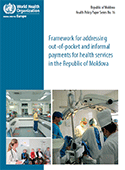Framework for addressing out-of-pocket and informal payments for health services in the Republic of Moldova (2014)

Download
In the context of the global movement towards universal health coverage, the Government of Republic of Moldova is committed to ensuring access to affordable, high-quality health care services through implementing reforms that reduce inequities, increase access to services and medicines, promote efficiency and improve financial protection. There is concern that out-of-pocket (OOP) payments and the presence of informal payments may hinder the implementation of this reform and achievement of the ultimate goal of expanding universal health coverage in the Republic of Moldova.
This report discusses how OOP and informal payments in the Republic of Moldova are affecting the reform objectives, presents a framework for understanding the causes of these payments, and suggests policy options to reduce them.
The discussion is based on data collected through review of documents, health laws and regulations; key informant interviews, focus groups with providers and patients, analysis of quantitative data on salaries and household care seeking behaviour and expenditures, and feedback collected at a policy workshop with relevant stakeholders.
The report findings point out that medicines represent the highest burden of OOP payments and such payments are more prevalent in inpatient facilities than outpatient. The report also looks at the significant proportion of informal payments, their amounts in different settings, and causes. The framework used in the report also looks at the perception of providers and patients about OOP and informal payments, providing a summary of drivers categorized in medicine-related, system-related and patient-related factors.
Looking at international experience, the report suggests a range of options for Republic of Moldova mainly focused on: reducing medicine prices; improving accountability of health-care workers and managers through administrative controls; lessening impunity through regulatory reform, detection and enforcement; implementing community monitoring mechanisms to strengthen social accountability; increasing individual provider incentives and improving organizational incentives for performance; formalizing unofficial payments; and improving transparency.



